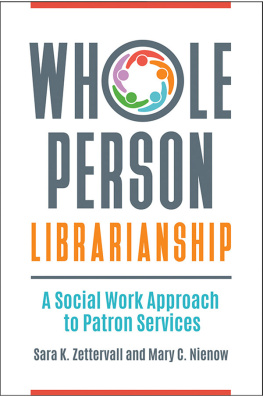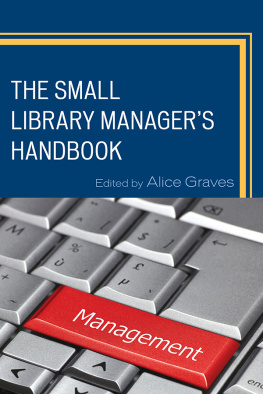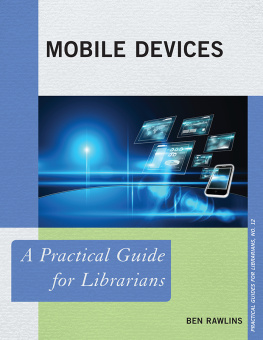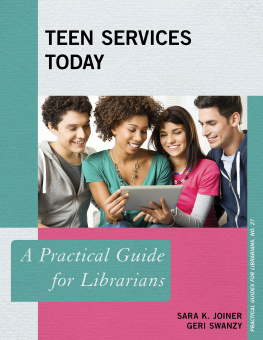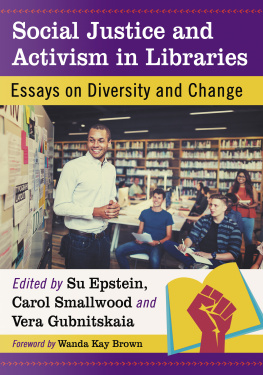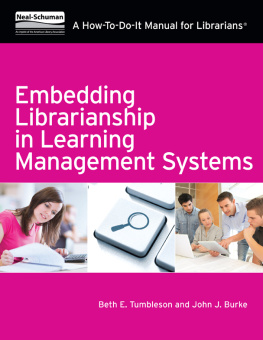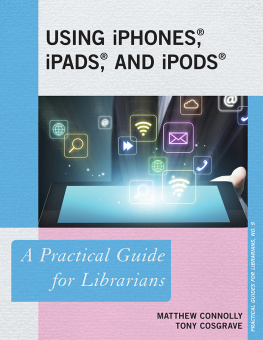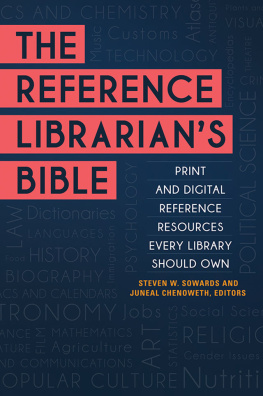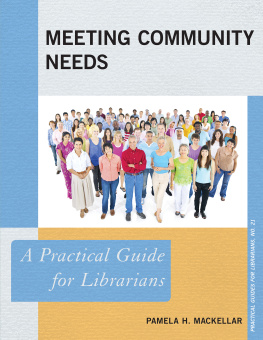Whole Person Librarianship
Whole Person Librarianship
A Social Work Approach to Patron Services
Sara K. Zettervall and Mary C. Nienow

Copyright 2019 by Sara K. Zettervall and Mary C. Nienow
All rights reserved. No part of this publication may be reproduced, stored in a retrieval system, or transmitted, in any form or by any means, electronic, mechanical, photocopying, recording, or otherwise, except for the inclusion of brief quotations in a review, without prior permission in writing from the publisher.
Library of Congress Cataloging-in-Publication Data
Names: Zettervall, Sara K., author. | Nienow, Mary C., author.
Title: Whole person librarianship : a social work approach to patron services / Sara K. Zettervall and Mary C. Nienow.
Description: Santa Barbara, California : Libraries Unlimited, [2019] | Includes bibliographical references and index.
Identifiers: LCCN 2019020672 (print) | LCCN 2019980955 (ebook) | ISBN 9781440857768 (paperback) | ISBN 9781440857775 (ebook)
Subjects: LCSH: Libraries and communityUnited States. | Public services (Libraries)United States. | Public services (Libraries)United StatesCase studies. | LibrariansProfessional relationshipsUnited States. | Library employeesProfessional relationshipsUnited States. | Social workersProfessional relationshipsUnited States. | Social serviceUnited States.
Classification: LCC Z716.4 .Z45 2019 (print) | LCC Z716.4 (ebook) | DDC 025.50973dc23
LC record available at https://lccn.loc.gov/2019020672
LC ebook record available at https://lccn.loc.gov/2019980955
ISBN: 978-1-4408-5776-8 (paperback)
978-1-4408-5777-5 (ebook)
23 22 21 20 191 2 3 4 5
This book is also available as an eBook.
Libraries Unlimited
An Imprint of ABC-CLIO, LLC
ABC-CLIO, LLC
147 Castilian Drive
Santa Barbara, California 93117
www.abc-clio.com
This book is printed on acid-free paper 
Manufactured in the United States of America
Contents
The collaboration that ultimately resulted in this book began in the summer of 2012. Sara was almost done with library school and was working on a practicum to lead a book club for a group of Somali girls. In planning for this work, the library systems community liaison outlined some challenging issues that could arise during book discussions. Would the girls talk about the lingering effects of civil war trauma in their families? Would they share frustrations they felt with older generations who pulled them toward more traditional ways? Saras practicum supervisor kept reminding the liaison, Saras not a social worker. However, Sara thought, I know some social workers who enjoy working with young people. So she invited Mary to co-lead the book club with her.
Although we, Mary and Sara, had been friends for years, our book club planning conversations were the first time wed been prompted to talk seriously about our professions. As a student, Sara was steeped in the library school culture of learning to connect people with resources. Shed learned a lot about gathering and organizing electronic and physical materials, as well as how to make them appealing to different audiences, but was beginning to realize she lacked some skills for working with the people on the other side of those transactions. One of the first things Mary told her social workers do is serve the whole person, paying attention to the multitude of factors impacting individuals in society, especially those who are vulnerable and often oppressed due to their race, religion, gender, or economic status. As Sara learned more, she realized this framework would be highly beneficial in librarianship as well. This is how the concept of Whole Person Librarianship (WPL) was born.
As we continued our conversations well beyond the book club, our curiosity was piqued: was anyone else in librarianship collaborating with social workers? Sara discovered a handful of urban libraries with social workers on staff, but there was very little written information available about these programs. In 2013, Saras friend and library colleague Paul Lai helped her develop and run a blog exploring and explaining library-social work collaboration and its implications for our professions. The timing was right to be pioneers in bringing people from this nascent community together, and that blog eventually became Whole Person Librarianship (www.wholepersonlibrarianship.com), which is now the worlds online hub for information, connection, and conversation around library-social work collaboration. Eventually, Paul retreated from regular participation, and we, Sara and Mary, were asked to present on and then write about the topic, leading to where we are today. Throughout, we continued to develop the concept of WPL to encompass both the practicalities of collaborating (who makes a good partner? how do we get started?) and the ways social work ideas can be applied to improve public service in libraries. Both parts of WPL, practice and concepts, are explored throughout this book.
The chapters in this book are arranged to guide readers from a basic understanding of the intersection of librarianship and social work through various stages of collaboration and into more complex social work concepts as they can apply to library service. Our primary audience is librarians and library staff, but we believe many social workers will also find this information interesting and useful. The books content is structured around a nationwide survey, a series of focus groups, and one-on-one interviews we conducted in 2017 and 2018. This is all original research, supplemented by cited additional articles and news items (which have been the primary way of finding out about new collaborations). The quotes you will read are from practicing librarians, library staff members, social workers, and related professionals who are engaged in collaborative work. With a few exceptions, which are noted in the text, we have changed their names and the names of their libraries in order to give them the freedom to speak openly about their experiences. Were eternally grateful for the honesty and enthusiasm they brought to participating in this book, which wouldnt exist without their contributions.
Every profession has its own jargon and ways of talking about its work that can be difficult for outsiders to understand. Librarianship and social work are no different, and weve tried throughout this book to define unfamiliar terms or concepts. In the case of acronyms, such as ALA for American Library Association, we introduce the full name once and then use the acronym for the rest of the book.
There are also familiar terms weve been thoughtful about using. We chose to use the common term patrons for people who come to the library for help; social workers would call those same individuals clients. Because this book is written primarily for a library audience, we most often stick to using patrons. The exceptions are times when we are writing about a distinctly social work situation or perspective, in which case we say client. Similarly, weve taken care in how we refer to librarians and social workers. Not all library staff are librarians, so we try to avoid using librarian as a catch-all term. When the concepts and activities we discuss can apply to anyone working in a library, we say library staff. When they are more specific to the type of work usually done by librarians, we say librarian. We also try to distinguish other roles with terms like front-facing staff, public service staff, managers, and administrators.

